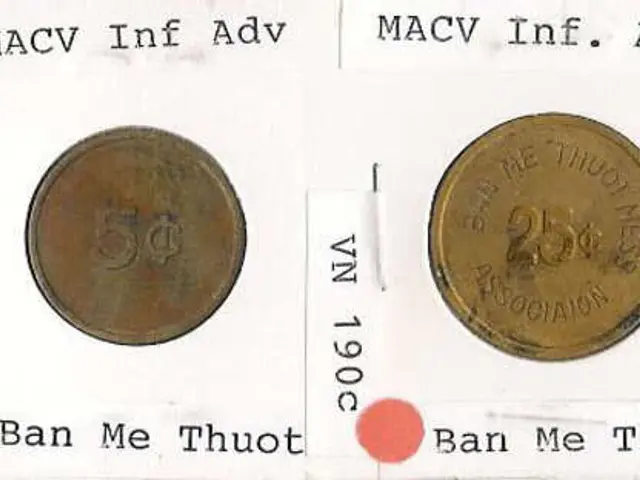Tactics for lowering U.S. tax obligations in the absence of a tax agreement
=========================================================================
Foreign entrepreneurs and investors looking to sell physical products in the United States through e-commerce platforms like Amazon, Shopify, eBay, Etsy, and Walmart Marketplace can benefit from understanding the tax implications of their business activities. This article outlines key strategies for minimizing the tax burden for foreign businesses operating in the US, particularly those without a tax treaty with the country.
Tax-Free Repatriation
One powerful tool for deferring US income tax on export profits is the Interest Charge Domestic International Sales Corporation (IC-DISC). This mechanism offers significant deferral and tax-saving benefits, reserved exclusively for exporters [1]. By strategically structuring their business around an IC-DISC, foreign businesses can realize dividends at favorable tax rates without immediate taxation on repatriation.
Offsetting Losses Against Gains
The US allows business losses to offset gains under certain conditions, but the rules vary by entity type. Corporations can net losses and gains within the entity, while pass-through entities (like LLCs taxed as partnerships) pass losses through to owners, who can offset other personal income subject to limitations. Strategic management of these losses depends on entity choice and the nature of income and expenses.
Interest on Loans
Recent significant tax legislation provides more clarity around how much interest is deductible for US tax purposes [4]. This means that foreign businesses should structure their financing to ensure interest payments are deductible, optimize debt terms, and locate finance activities where interest deductibility rules are more favorable.
Business Structure (LLC vs. Corporation)
- An LLC offers pass-through taxation, avoiding double taxation, which benefits owners if they can use foreign tax credits or exclusions personally. However, it does not provide access to US-specific corporate benefits like the IC-DISC or Foreign-Derived Intangible Income (FDII) deduction [5].
- A US C Corporation enables access to deductions like the FDII for IP-related foreign income, and can qualify for qualified small business stock benefits, but risks double taxation on repatriated profits unless structured with distributions like IC-DISC dividends or by reinvesting earnings [2][5]. Converting to or structuring as a C corporation can unlock specific deductions and exclusions but requires careful planning to avoid pitfalls such as loss of QSBS eligibility when converting foreign entities into US corporations [2].
Foreign Tax Credits
Since there is no tax treaty, foreign tax credits for taxes paid outside the US are unavailable to offset US taxes. This makes careful structuring even more critical. Maintaining detailed records and consulting international tax professionals are essential to maximize available benefits and avoid costly mistakes [3].
In summary, for a foreign business without a tax treaty with the US:
- Consider forming a US C corporation to utilize IC-DISC for tax-deferral on export profits and to access FDII benefits if applicable.
- Use IC-DISC dividends to achieve favorable tax treatment on repatriation.
- Strategically manage financing to maximize interest deductibility under recent US tax law changes.
- Employ losses within entity structures efficiently depending on entity type.
- Work closely with tax advisers to track foreign vs. US income, preserve QSBS eligibility, and coordinate filing requirements.
These strategies, tailored to your business specifics, will minimize overall US tax burden despite the lack of a treaty [1][2][3][4][5].
Investing in the US is attractive due to transparent fiscal policies, a robust political and legal system, economic stability, and lack of currency restrictions. Other business structures, such as partnerships or US branches of foreign parents, can also circumvent double taxation but offer less liability protections. Forming an LLC instead of a corporation can help minimize taxes as LLCs are not double taxed and are easy to set up and maintain. S-corporation elections can offer savings on self-employment taxes and pass-through taxation for US citizens abroad and non-resident business owners.
[1] IRS.gov, "Interest Charge Domestic International Sales Corporation (IC-DISC)", accessed 2022-03-01. [2] Deloitte, "Foreign Investment in the U.S.: Tax Considerations for Corporate Structuring", accessed 2022-03-01. [3] KPMG, "Tax Reform: Opportunities and Challenges for Foreign Investors", accessed 2022-03-01. [4] Tax Foundation, "The Tax Cuts and Jobs Act: A Comprehensive Overview", accessed 2022-03-01. [5] PwC, "US tax reform: What you need to know", accessed 2022-03-01.
- To maximize savings for exporting businesses in the United States, consider strategizing the business structure to access the advantages of the Interest Charge Domestic International Sales Corporation (IC-DISC) and Foreign-Derived Intangible Income (FDII) deduction, such as forming a US C corporation or S-corporation, depending on personal circumstances and business objectives.
- In addition to structuring business activities to minimize taxation, it is crucial for foreign business owners to optimize financing and interest deductibility, particularly in light of recent tax legislation changes, to further reduce the overall US tax burden.




